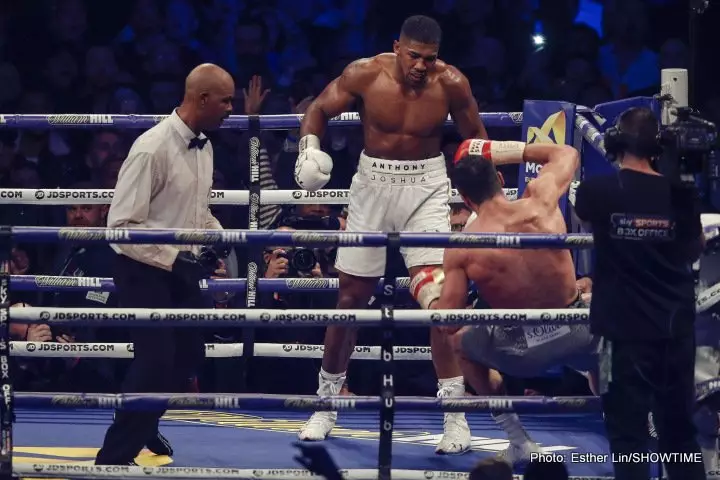The boxing world often pivots on defining moments that shape the careers of athletes, and for Anthony Joshua, that pivotal moment arrived in April 2017. When he faced off against the long-standing heavyweight champion Wladimir Klitschko at Wembley Stadium, it was not merely a battle for the IBF heavyweight title; it transformed Joshua into a household name. With an electrifying atmosphere and a gripping narrative, the fight showcased Joshua’s resilience and skill, ultimately leading to a late knockout that cemented his legacy in the sport.
This victory, however, was not without its controversies and second-guesses. At one point in the match, Joshua found himself on the canvas, a rarity for a fighter who had risen steadily through the ranks. Critics have since speculated whether Klitschko, who had him hurt in the sixth round, could have capitalized on the moment and delivered a definitive blow in the subsequent round, potentially altering the outcome of the fight. This raises compelling questions about decision-making under pressure and the delicate psychology of heavyweight boxing.
Vitali Klitschko, Wladimir’s older brother and a former heavyweight champion himself, weighed in on this discussion during a recent interview with Sky Sports. He acknowledged the unpredictability of boxing and expressed his mixed feelings about the word “if.” This expression of hesitation speaks volumes; it reflects a nuanced understanding that hesitation and missed opportunities can haunt athletes long after the final bell rings. Vitali emphasized that while Wladimir was well-prepared, certain facets of strategy and mental fortitude came into play, ultimately allowing Joshua to seize the upper hand.
Vitali’s perspective is particularly insightful; he shared the emotional turbulence he felt from the corner during that fight. The pressure of guiding a sibling in such a high-stakes encounter amplifies the stakes not only for the fighters but also for their supportive network. His admission of nervousness speaks to the inescapable tension that accompanies championship fights—a tension that can lead to momentary lapses in judgment that may affect the course of the match.
As fans and analysts have often pondered the potential “what-ifs” that could have arisen from Wladimir’s fighting strategy during the seventh round, it’s clear that boxing’s unpredictability remains its most thrilling yet maddening aspect. Speculating on alternate outcomes opens a Pandora’s box of hypothetical scenarios. What if Wladimir had pressed forward with relentless aggression? Could Joshua have weathered the storm and emerged victorious regardless? Perhaps this uncertainty is what makes boxing a captivating sport—no two fights are alike, and the outcome often rests on the razor-thin margin of decision-making.
Both Klitschko brothers appear to have embraced a philosophy of moving forward without dwelling on past matches. While many fans still engage in discussions about missed opportunities, Vitali has shown a focus on the present, especially as he roots for Joshua’s upcoming fight against Daniel Dubois. His comments reveal a level of respect for Joshua, whom he labels a “good man,” while acknowledging the ever-present volatility in heavyweight boxing. This sentiment underscores the idea that champions must always be ready for the unexpected and evolve with each encounter.
As Joshua prepares for another crucial clash, the focus shifts to his potential performance against Dubois. In boxing, even the slightest technical error or lapse of concentration can be catastrophic. The heavyweight division is unforgiving, with the power of a single punch capable of determining a fighter’s fate inside the ring. Fans eagerly anticipate how Joshua will navigate the challenges posed by Dubois, knowing that lessons from the past—both in terms of strategy and psychology—will play a crucial role.
Ultimately, the story of Anthony Joshua, the Klitschko brothers, and their pivotal encounters serves as a profound lesson about the nature of competition. It encapsulates the blend of physical prowess, strategic thinking, emotional resilience, and the unpredictable nature of sport. In boxing, as in life, tomorrow’s victory relies on today’s choices and a willingness to learn from both triumphs and shortcomings.

